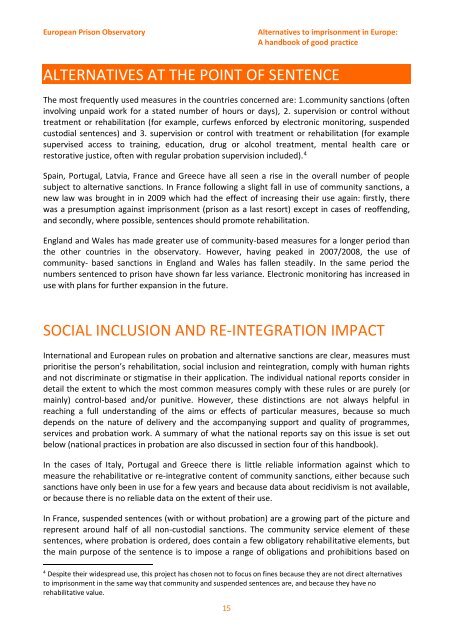good practice
Alternatives%20to%20imprisonment%20in%20Europe
Alternatives%20to%20imprisonment%20in%20Europe
Create successful ePaper yourself
Turn your PDF publications into a flip-book with our unique Google optimized e-Paper software.
European Prison Observatory<br />
Alternatives to imprisonment in Europe:<br />
A handbook of <strong>good</strong> <strong>practice</strong><br />
ALTERNATIVES AT THE POINT OF SENTENCE<br />
The most frequently used measures in the countries concerned are: 1.community sanctions (often<br />
involving unpaid work for a stated number of hours or days), 2. supervision or control without<br />
treatment or rehabilitation (for example, curfews enforced by electronic monitoring, suspended<br />
custodial sentences) and 3. supervision or control with treatment or rehabilitation (for example<br />
supervised access to training, education, drug or alcohol treatment, mental health care or<br />
restorative justice, often with regular probation supervision included). 4<br />
Spain, Portugal, Latvia, France and Greece have all seen a rise in the overall number of people<br />
subject to alternative sanctions. In France following a slight fall in use of community sanctions, a<br />
new law was brought in in 2009 which had the effect of increasing their use again: firstly, there<br />
was a presumption against imprisonment (prison as a last resort) except in cases of reoffending,<br />
and secondly, where possible, sentences should promote rehabilitation.<br />
England and Wales has made greater use of community-based measures for a longer period than<br />
the other countries in the observatory. However, having peaked in 2007/2008, the use of<br />
community- based sanctions in England and Wales has fallen steadily. In the same period the<br />
numbers sentenced to prison have shown far less variance. Electronic monitoring has increased in<br />
use with plans for further expansion in the future.<br />
SOCIAL INCLUSION AND RE-INTEGRATION IMPACT<br />
International and European rules on probation and alternative sanctions are clear, measures must<br />
prioritise the person’s rehabilitation, social inclusion and reintegration, comply with human rights<br />
and not discriminate or stigmatise in their application. The individual national reports consider in<br />
detail the extent to which the most common measures comply with these rules or are purely (or<br />
mainly) control-based and/or punitive. However, these distinctions are not always helpful in<br />
reaching a full understanding of the aims or effects of particular measures, because so much<br />
depends on the nature of delivery and the accompanying support and quality of programmes,<br />
services and probation work. A summary of what the national reports say on this issue is set out<br />
below (national <strong>practice</strong>s in probation are also discussed in section four of this handbook).<br />
In the cases of Italy, Portugal and Greece there is little reliable information against which to<br />
measure the rehabilitative or re-integrative content of community sanctions, either because such<br />
sanctions have only been in use for a few years and because data about recidivism is not available,<br />
or because there is no reliable data on the extent of their use.<br />
In France, suspended sentences (with or without probation) are a growing part of the picture and<br />
represent around half of all non-custodial sanctions. The community service element of these<br />
sentences, where probation is ordered, does contain a few obligatory rehabilitative elements, but<br />
the main purpose of the sentence is to impose a range of obligations and prohibitions based on<br />
4<br />
Despite their widespread use, this project has chosen not to focus on fines because they are not direct alternatives<br />
to imprisonment in the same way that community and suspended sentences are, and because they have no<br />
rehabilitative value.<br />
15





